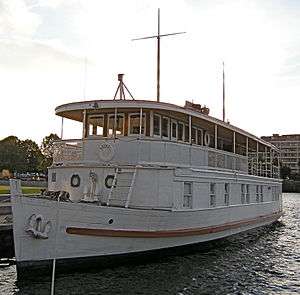Lotus (motor vessel)
 Lotus in 2008 at Northwest Seaport on Lake Union. | |
| History | |
|---|---|
| Name: | Lotus |
| Route: | Puget Sound |
| In service: | 1909 |
| Identification: | US registry # 206231; signal letters L.B.C.M. |
| Status: | Operational as of 2011 |
| General characteristics | |
| Type: | inland motor launch |
| Tonnage: | as built (1909) : 130 gross, 88 registered tons |
| Length: | as built (1909) : 85 ft (25.91 m) |
| Beam: | 18.3 ft (5.58 m) |
| Depth: | 4.2 ft (1.28 m) |
| Installed power: | gasoline engine, 80 indicated HP |
|
Louts (motor vessel) | |
 | |
| Location | 860 Terry Avenue North, Seattle, WA 98109 |
|---|---|
| Coordinates | 47°37′41.8″N 122°20′12.5″W / 47.628278°N 122.336806°WCoordinates: 47°37′41.8″N 122°20′12.5″W / 47.628278°N 122.336806°W |
| Built | 1908 |
| Architect | Lee and Brinton |
| Architectural style | Other |
| NRHP Reference # | 87000715 |
| Added to NRHP | 1987-05-18 |
Lotus is a motor houseboat yacht, launched in 1909. Lotus was employed as a pleasure vessel on Puget Sound, and in the waters of British Columbia and southeastern Alaska. Lotus was of a unique design and is now on the National Register of Historic Places.
Design and construction
Lotus was built in 1908-1909 at Seattle, Washington for Maurice McMicken (1860-1940), a lawyer and businessman. The vessel was launched in May 1909, and was at that time the largest privately owned motor yacht on the west coast of the United States. The yacht was designed by Lee and Brinton, and constructed by Joseph A. Sloane. The yacht had accommodations for a party of 10 as well as a crew of four. The yacht carried enough fuel to have a range of 1,500 miles (2,400 km).[1]
As originally built, the vessel was 85 feet (26 m) long, 12.5 feet (3.8 m) beam, and 4.2 feet (1.3 m) in depth of hold. Overall size was 133 gross and 88 registered tons. Only two crew were required according to the 1911 merchant vessel registry. As of 1911, the vessel was powered with a "Globe" gas-distallate (early diesel) engine that generated 80 indicated horsepower. The vessel's U.S. Registry number was US registry # 206231 and the signal letters were L.B.C.M[2]
Career
McMicken owned Lotus until his death in 1940. He used the yacht to cruise the waters of Washington, British Columbia, and southeast Alaska. Shortage of fuel forced the yacht to be tied up throughout the Second World War. McMicken's heirs sold the yacht in 1947. The yacht was sold again in 1951 to a family which moored the yacht in Lake Union and lived on it as a full-time residence. In 1961 the yacht was sold again, to Maj. (later Col.) Curtis Gruye, an Air Force officer, and a jet pilot.[3] Gruye restored the yacht and operated it as a floating hotel for a number of years. In 1977, Gruye sold the yacht to Gordon R. Newell, an author and maritime historian. Newell moved the yacht to a marina in Olympia, where the yacht remained. In 1981, Gruye bought the yacht back from Newell, and began an extensive restoration program, which by 1982 was able to return the yacht to an operable condition.[1]
Current status
Lotus was listed on the National Register of Historic Places in 1987.[4] It is now maintained by the Motor Vessel Lotus foundation and is moored in the Historic Ships Wharf at the Center for Wooden Boats in Seattle, Washington.[5]
Notes
- 1 2 National Register of Historic Places, Inventory – Nomination Form, “Motor vessel 'Lotus'” (March 31, 1987), at page 234. (accessed 06-16-11).
- ↑ U.S. Dept. of the Treasury, Bureau of Statistics, Annual List of Merchant Vessels of the United States (for year ending June 30, 1911) (accessed 06-16-11).
- ↑ Newell, ed., McCurdy Marine History, at page 663.
- ↑ "LOTUS (motor vessel)". NPS Focus Digital Library and Research Station. US Department of the Interior. Archived from the original on 2015-04-12. Retrieved 2015-04-12.
- ↑ "Contact Us". MV Lotus Heritage Foundation. Archived from the original on 2015-04-12. Retrieved 2015-04-12.
References
- National Register of Historic Places, Inventory – Nomination Form, “Motor vessel 'Lotus'” (March 31, 1987) (accessed 06-16-11)
- Newell, Gordon R., ed., H.W. McCurdy Marine History of the Pacific Northwest, Superior Publishing Co., Seattle, WA (1966)
- U.S. Dept. of the Treasury, Bureau of Statistics, Annual List of Merchant Vessels of the United States (for year ending June 30, 1911) (accessed 06-16-11).
External links
| Wikimedia Commons has media related to Lotus. |
